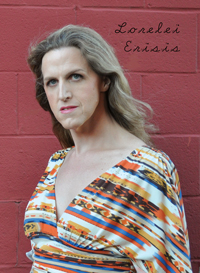By: Lorelei Erisis*/TRT Columnist—
One of the advantages to having a column of my own, especially as an activist, is having a little soapbox to hop up onto when things get under my skin or when there’s something really important I feel folks need to know about. In this case, it’s the subject of discrimination against trans people in public accommodations.
If you’re a regular reader of this paper and its associated website, which I sincerely hope you are, you may have noticed a little piece about the release of the Project VOICE Report on Transgender Discrimination. The report represented the findings of a survey by the Fenway Institute and Massachusetts Transgender Political Coalition (MTPC) looking at discrimination of transgender and gender non-conforming adults in Massachusetts.
Now, full-disclosure, your friendly neighborhood trans columnist here served as an outreach consultant in implementing the survey, basically because I know an extraordinary number of trans people. In the course of reaching out to people last fall to ask them to fill out the survey, I had the occasion to think a lot about the nature of trans discrimination. In addition, in the past week, as part of the media outreach around publication of the report itself, I was asked to speak to reporters from WBUR and The Boston Globe about my own experiences with discrimination.
Some of those experiences you will have read about right here in this column, but for every story I’ve talked about publicly, there are many more I haven’t. The thing that struck me most dramatically in thinking about the survey, talking to reporters, and meeting and getting to know all sorts of trans and gender non-conforming folks, is that most of the discrimination we face is not of the super-dramatic, shocking and horrifying variety that makes great newspaper copy or drives big stories. It’s banal and pervasive. It’s the death by a thousand cuts. [pullquote]It’s being casually misgendered 17 times a day, often by people who don’t even notice they’re doing it. It’s not receiving proper care for health issues because we are afraid to go to the doctor or to a hospital and face a proliferation of healthcare professionals who simply don’t know how to treat us, who will use the wrong pronouns and old names and make insulting remarks and injurious diagnoses because they have never been trained to care properly for us. It’s being afraid to use a public restroom…[/pullquote]
It’s being casually misgendered 17 times a day, often by people who don’t even notice they’re doing it. It’s not receiving proper care for health issues because we are afraid to go to the doctor or to a hospital and face a proliferation of healthcare professionals who simply don’t know how to treat us, who will use the wrong pronouns and old names and make insulting remarks and injurious diagnoses because they have never been trained to care properly for us. It’s being afraid to use a public restroom because although 90 percent of the time people are pretty cool and no one bothers us, all it takes is for one person to have a problem and we could face the very real threat of being arrested or humiliated or even beaten.
All because we had to pee.
It’s living with the contradiction that while a restaurant can no longer legally refuse to hire us because we are trans, they can refuse to serve us as customers. It’s being unexpectedly, deliberately and very publicly humiliated by a bus driver, who refuses to use your proper pronouns even after being politely corrected, or being threatened with arrest and refused entry to a government building by Homeland Security, and having little to no recourse, even if you’re a newspaper columnist.
The worst thing is having to just stuff all of this down inside and try not to think about or dwell on it for too long because we’d never be able to get anything done or even leave the house if we did.
For me, helping out with this report, reaching out to folks and talking about discrimination in public accommodations really brought all that back for me: all the many minor incidents and a few much more dramatic ones, incidents that I have deliberately put out of mind for the reasons I’ve already mentioned and because as an activist, I usually prefer to focus on the positives of being trans. [pullquote]It’s being unexpectedly, deliberately and very publicly humiliated by a bus driver, who refuses to use your proper pronouns even after being politely corrected, or being threatened with arrest and refused entry to a government building by Homeland Security, and having little to no recourse, even if you’re a newspaper columnist.[/pullquote]
But sometimes, we have to remember. People need to be told. They need to know that the discrimination trans people face is a very real thing, with very serious consequences for our health and for our very lives.
So, what can we do about all this?
First, if you have the opportunity, I would suggest you download a copy of the Project VOICE Report on Transgender Discrimination and read the results for yourself. It’s free and you can find it by going either to www.masstpc.org or www.thefenwayinstitute.org. The findings tell quite a story in themselves.
If you live in Massachusetts, I would urge you to contact your state representatives and senators and ask them to support the Equal Access Bill. You can also work to help implement equal access ordinances in your local communities.
Although in 2011 we did pass “An Act Relative To Gender Identity” which provided protections against discrimination in employment, credit, education, and housing, as well as hate crime protections, the new “Trans Equal Rights” law did not include protections against discrimination in public accommodations (any place open to the public, such as hospitals, restaurants, public transit, and libraries. )
Beyond this, we need the help of people like you to ensure people actually know about and respect the current law, and most importantly, we need to educate. Spread the word about trans discrimination and trans lives to your unique communities, your workplaces, clubs, organizations and families.
Your voice—all of your voices, with ours, speaking up and lighting a fiery path through the darkness of ignorance—is what we need. And we need it now.
Slainte!
*Lorelei Erisis is an actor, activist, adventurer, and pageant queen. Send your questions about trans issues, gender and sexuality to her at askatranswoman@gmail.com.









This confirms to me that gender discrimination is world wide. I have received threat of being beaten and murdered. I gave had deliberate miss gendering at church and in the doctors surgery waiting room where I my was referred to by my male name and sir. I had gone there to have my surgery verified to legally changing my name. The doctor fumbled around with the paper work then refused to do anything. At department stores I have been called sir despite the fact that I was wearing a skirt. The most open to my transition were clubs and uni and friends where I was referred to in my female name and female pronouns were used. One time I was defended by a uni lecturer when someone was rude to me in reference to my transition.
Thank you for sharing your own experience Stephanie. Yes, this is a world wide problem. Perhaps there are some places where things are worse and others where they are a bit better. But overall, even with all the progress we have made, it’s still a very, very difficult world in which to be trans.
Keep fighting though!! And never let anyone make you think you re any less of an amazing woman!
Slainte!